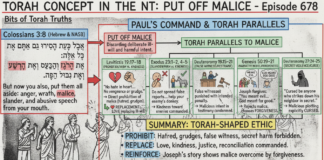In this week’s reading from Parashat Massei (Bamidbar / Numbers 33:1-36:13), the final chapters of sefer Bamidbar, Moshe is instructing the people on how the land of Canaan is to be divided amongst the people and the priests. In 33:55, the Lord God gives a warning:וְאִם-לֹא תוֹרִישׁוּ אֶת-יֹשְׁבֵי הָאָרֶץ מִפְּנֵיכֶם וְהָיָה אֲשֶׁר תּוֹתִירוּ מֵהֶם לְשִֹכִּים בְּעֵינֵיכֶם וְלִצְנִינִם בְּצִדֵּיכֶם וְצָרְרוּ אֶתְכֶם עַל-הָאָרֶץ אֲשֶׁר אַתֶּם ישְׁבִים בָּהּ saying “if you do not drive out the inhabitants of the land from before you, then it shall come about that those whom you let remain of them will become as pricks in your eyes and as thorns in your sides, and they will trouble you in the land in which you live.” The Lord is warning the children of Yisrael to remain focused and to remove those things that will distract them. The principle object that distracted Yisrael was bad and sinful people. They are commanded to drive them out or the people will become a thorn in their side וְלִצְנִינִם בְּצִדֵּיכֶם. The NASB says that the phrase לְשִֹכִּים בְּעֵינֵיכֶם means “pricks in your eyes.” It is interesting that the word לשכים is not found in Brown-Driver-Briggs lexicon. Strong’s concordance says לשכים is from the word שכך (to appease, placate) in the sense of the word שוך. From what I can understand, the translators looked at לשכים and in an attempt to determine the root and morphology of the word conclude that שוך ß שכך ß לשכים. This morphology for the word לשכים does not seem to fit for its definition as “pricks.” לשכים may also be formed by ל.ש.כונה whereכונה a feminine noun meaning “intention, purpose, aim, spirit.” Regardless of its translation, לשכים suggests that the people of Canaan will affect the “aim,” “intent,” or “spirit” of the eye. Do these scriptures suggest the people we choose as friends can affect our walk and the intent of our heart before God? Read More here.








